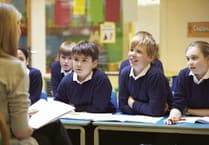THE headteacher at Forest High School says he is “confident and positive” about the future despite the school being placed in special measures by Ofsted this month.
The secondary school on Causeway Road in Cinderford was found to be ‘Inadequate’ by Ofsted in a recent inspection, having previously been told it ‘Requires Improvement’ in 2018.
The inspection found the school was not providing a broad and effective curriculum for every student, that there is poor behaviour in every lesson and that the school was not led well in some areas.
The school will now be closely monitored by inspectors with visits every term next year.
The opening paragraph of the report states: “The quality of education pupils receive is not good enough.
“Staff have low expectations of pupils, particularly pupils with special educational needs and/or disabilities and pupils who speak English as an additional language.”
The report says parents support headteacher Mr Alan Dane, who was appointed in January, and that he has already made some improvements such as behaviour around the school.
But it adds: “…there is still a long way to go. Learning is, too often, disrupted by poor behaviour. This is because the pupils’ needs are not always met well enough.”
Mr Dane says that issues that were “quite rightly” highlighted in the Ofsted report were ones he was aware of before he took the job, and were part of the reason why he chose to join the school.
“No school is happy to be put in special measures by Ofsted,” Mr Dane said.
“However the things that they put in the report, and the things we discussed with them at length during their two days with us, are very much things that I was aware of when I became the headteacher.
“Some of them are the reason I wanted to be the headteacher here to fix them, and we’ve done a huge amount of work both before they came and since they came to address them.”
He explained that many of the changes the school is implementing have “not yet borne fruit”, which was highlighted in the Ofsted report.
He says that some of the biggest issues identified were with the school’s curriculum, which he has actively looked to address since his appointment.
“When I came in, things like music, food technology and computing were not on the curriculum, for the whole school anyway.
“I’ve been working with the SGS multi academy trust to get a lot of money to bring in extra staff next year to offer those subjects.”
He added the facilities are also in place to deliver those subjects next term, including an “amazing” IT suite and “fantastic” catering room.
He also described the school’s existing sports facilities as “extraordinary”, but said that access to them has been limited.
He says the school has now recruited a “fantastic” new PE teacher who has opened up opportunities for the students to get more out of the facilities.
He added that many of the issues also centred around the quality of teaching, including for SEN students, which make up about 30 per cent of the school, and children who have English as an additional language.
“Those are things we’ve started doing a lot of work on with staff in terms of how they plan their lessons, which again have not yet borne fruit.”
In the classroom, he is working with staff to review what, when and how they teach their subjects, and instil a culture of joined-up working with the school’s specialist SEN team to ensure lessons are accessible for all students.
The school has also recruited 12 new staff members to start in September - leaders and teachers - equating to almost half of the current workforce.
Mr Dane says the staff will “bring new skills to the Forest” having been successful at other schools.
He also wants there to be a focus on student wellbeing, having recruited a support officer to help the young people make “good choices”, both with their behaviour in school and their lives outside of school.
“We want to be a school where we’re not making children do something for the sake of doing it, we’re doing it because it’ll help them learn, and helping them learn by making mistakes, trying things out, experimenting and developing new ways of thinking.”
Mr Dane says he wanted to become the headteacher at Forest High because he could see the “untold potential of these young people, and this school” when he first visited in November last year.
He added that while great things have happened at the school in the past, the consistent standard has never once been judged ‘Good’ by Ofsted - which he says “is just not okay for the young people of Cinderford”.
The school was previously judged ‘inadequate’ by Ofsted in May 2015, just weeks after it was sponsored by South Gloucestershire and Stroud College Academy Trust (SGSCT).
“What’s really interesting is that members of the community I’ve spoken to have said ‘Oh, I thought you’d always been in special measures’ - there’s not a perception that things at the school have got much better”.
He described the latest inspection as an opportunity to establish exactly what needs to be done, “and then make sure we do it”.
He says that delivering improvments through investing in buildings and the recruitment of new staff will help win the trust of parents and the local community, as will ensuring the school communicates in an “open and honest” way.
To achieve that, he has started hosting weekly coffee mornings which parents can attend just for a chat or to discuss problems, and is also inviting parents to attend an open evening to talk about the Ofsted report, as well as one for the local community.
He says that part of that was sending out a letter to parents informing them of the school’s new supervision room concept, in which students work independently on tasks in silence when staff are absent and suitable cover is not available.
The school operated a ‘zero tolerance’ policy in the room for a period in order to enforce the rules, which saw students receive a half day suspension if they ignored an initial warning to work in silence.
The ‘zero tolerance’ policy was controversial amongst some parents, but Mr Dane says the school has already moved past that stage, and now enforces standard school rules in the room.
He stressed that while ‘zero tolerance’ was successful in terms of students understanding how to behave in the room, the policy “is not what this school is really about”.
He explained that the policy was never about “squashing” students, but was rather about setting boundaries, and was “a means to an end” to make sure the concept was successful long term.




